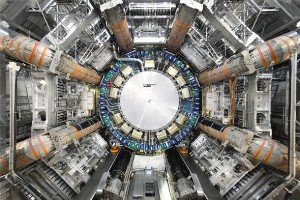Jan 30 2014
Ever since CERN, the European Organization for Nuclear Research in Switzerland, began its operations at the Large Hadron Collider in 2008, its researchers have pushed for their results to be publicly accessible. The field of high-energy experimental physics is a bit of an anomaly in the scientific arena. It’s a relatively small community—about 15,000 scientists globally—and one that is acutely dependent on collaboration and sharing (about half of those scientists are spread across just the four LHC experiments).
 From its inception, researchers at the Large Hadron Collider have made sure their results were publicly available. A new international collaboration will streamline that process. Photo via CERN.
From its inception, researchers at the Large Hadron Collider have made sure their results were publicly available. A new international collaboration will streamline that process. Photo via CERN.
Thus, the notion of open-access publication is deeply ingrained in the nature of the field. But until recently, maintaining that ethic has not been all that straightforward. That’s because each CERN paper’s open-access publication had to be individually negotiated since most of the peer-reviewed journals in which the articles appear are not traditionally open. At a rate of about 7,000 articles per year, this is not a trivial task.
Northeastern University physics professor George Alverson serves as the head of the publications office for one of the four LHC experiments and knows the challenges of the piecemeal approach. “We have a very involved and rigorous internal review process,” he said. “It’ll take a year or two from data to submission to the journal.”
So Alverson and his colleagues rejoiced on Jan. 1 when a six-year project to streamline the open-access publication of CERN results finally came to fruition. The new method is made possible by Sponsoring Consortium for Open Access Publishing in Particle Physics, or SCOAP3, an international syndicate of university libraries including Northeastern’s Snell Library, funding agencies, and research institutions.
These organizations have essentially traded their subscription fees to 10 of the most widely represented journals in the field for membership in the consortium. SCOAP3 uses those funds to help the journals offset the cost of making all their high-energy physics papers open-access.
It’s a new model that holds great promise in an era of increasing focus on open-access science. “Funding agencies want to see public monies spent where the public can see the results,” Alverson said.
In 2009, the White House issued a trendsetting mandate that all research funded by the National Institutes of Health be made available to the public, followed in 2013 by similar instructions for all agencies with R&D budgets in excess of $100 million. This would include the National Science Foundation and the Department Of Energy, funders of the U.S. activity in high-energy physics.
If the model works for high-energy physics, it may be relevant for other fields as well, noted Hillary Corbett, the scholarly communication librarian and university copyright officer who helped usher forward Northeastern’s participation in SCOAP3. “The hope is that this will become a successful model for funding publishing,” she said.
Such a shift could have a profound impact on the way science and research is done.